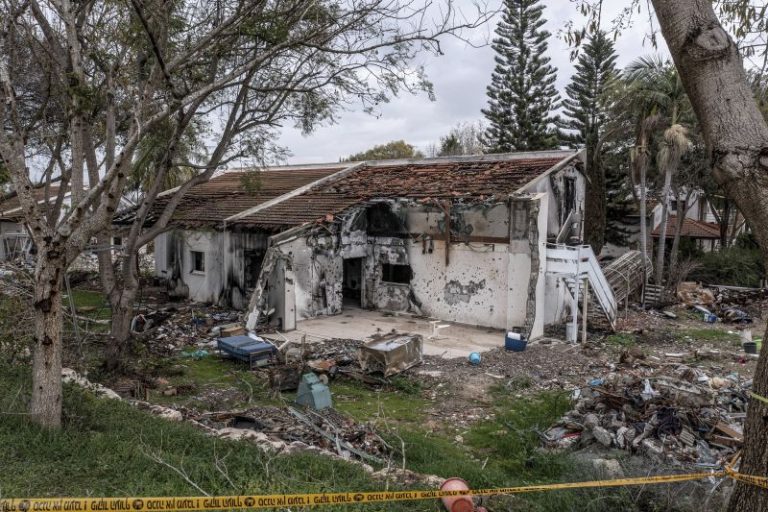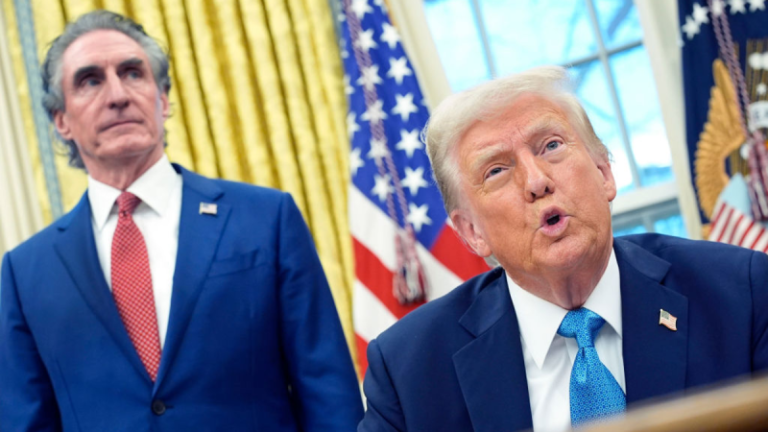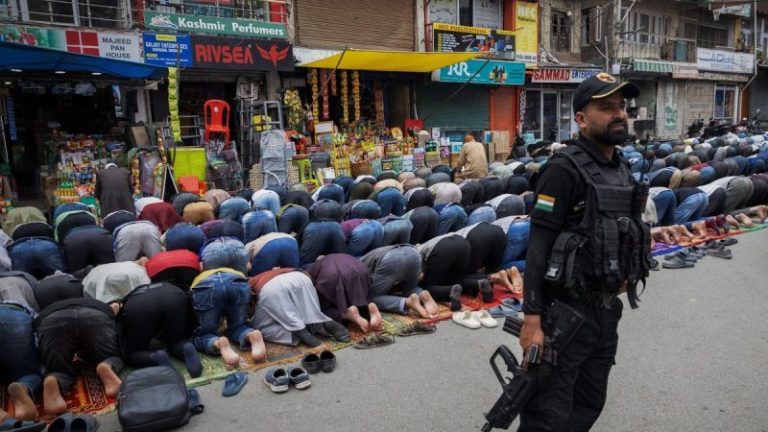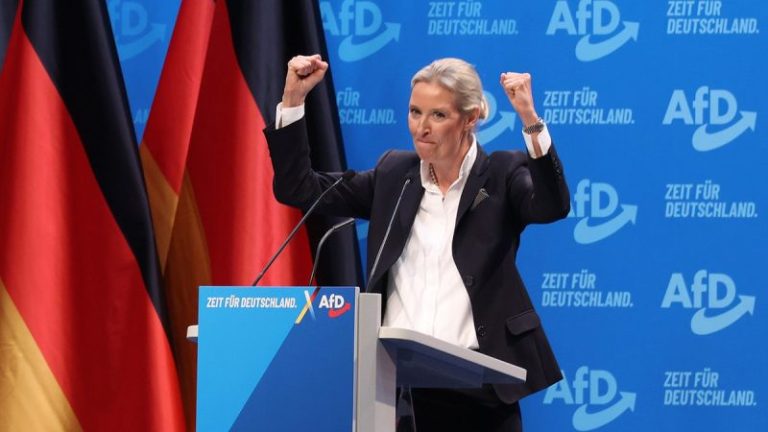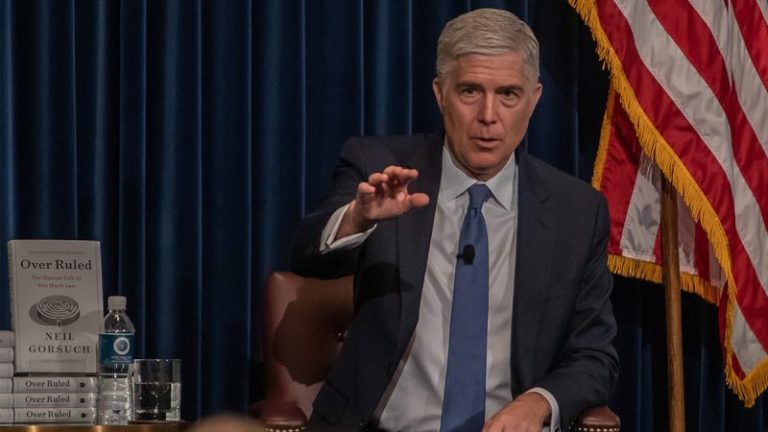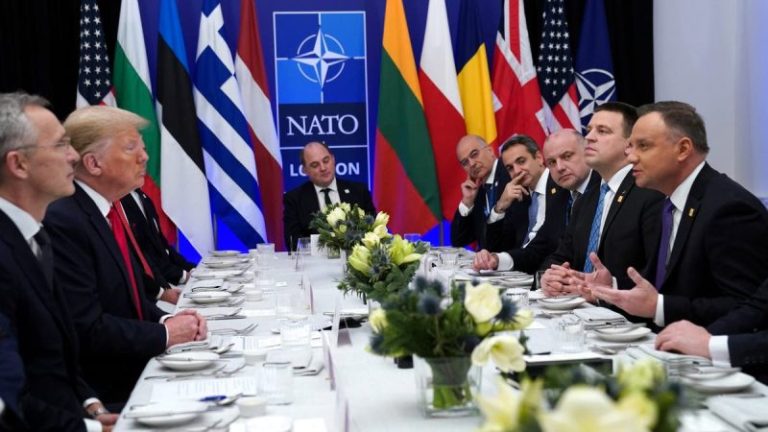Sitting inside her new apartment in kibbutz Tzora, a leafy community just west of Jerusalem, Almog Holot ran her fingers over a bowl of crystals as the wind chime on her balcony blew in the breeze.
Eighteen months ago, she spent 12 hours gripping the handle of her safe room door in kibbutz Nirim as she, along with her mother and her children – then 6 and 8 years old – hid from Hamas militants, who threw grenades at their house, ransacked their home and terrorized their community.
Five people were killed and another five were kidnapped from Holot’s kibbutz on October 7, 2023, when Hamas and other militant groups launched a coordinated terror attack on Israeli communities and military posts, killing 1,200 and kidnapping 251 people.
Holot and her family survived. But her belief in peace did not.
Holot and her ex-husband, who is from Nirim, a kibbutz about 2 kilometers (approximately 1.2 miles) from the Gaza border, had decided to raise their family there, believing it was the best place for their children.
“Kibbutzes are like paradise on earth in many ways,” she said. “You live in a community where money is not the most important thing… people know each other, people care about each other, and people help each other.”
While her children grew up “in a reality in which in every single second of every single day, a rocket might hit them,” Holot said that before October 7, such attacks were rare.
“Most of the time it was really peaceful,” she said. “My children knew to answer people that the people who threw rockets were just Hamas, and most of the people in Gaza are good – just like them.”
Like many residents of kibbutzim – or communal settlements – located near the Gaza border, Holot says she holds left-leaning political views. And like many so-called kibbutzniks, she too believed in, and advocated for, peace with Palestinians.
People from outside of her kibbutz used to tell her that her views were “naïve,” she said. Now she believes they were right.
“I can no longer say that 95% of them (Palestinians) want to live in peace,” Holot said, adding that many in her community were “surprised” by the attacks, but not because of the actions of Hamas.
“We thought (Gazans) were like us. And it turned out, no, they’re not,” she said, alleging that “common people of Gaza” were involved in the looting of October 7 and expressed support for the attacks.
It’s an attitude that Avida Bachar, from nearby kibbutz Be’eri also shares. Bachar lost his wife, his teenage son and his right leg in the attacks, in which 100 of the kibbutz’s 1,100 residents were killed.
Prior to October 7, Bachar believed that Palestinians and Israelis could coexist.
Now, he believes that Israel should raze Gaza and take complete control of it.
“We have to take the border, to move the border, and put potatoes and peanut fields there (in Gaza), until the sea. That is a different system, and we have to do it,” he said, acknowledging that his support of such an extreme idea would have surprised him prior to the war.
Such shifts in attitudes aren’t surprising for survivors of extreme trauma, said Merav Roth, a Haifa-based clinical psychologist and psychoanalyst.
“It takes most of your energy just to survive mentally. And that’s why they don’t have spare energy to think of ‘the other,’” Roth said, adding that they are often in “fight or flight” mode and react in “binary, primitive ways.”
“When you’re in chaos, when you’re intimidated, when you’re threatened, you split the world into two: total good and total bad… and revenge is an illusion of becoming strong,” Roth said.
So, by operating with a mentality of “I don’t want to think about them. I don’t want to solve anything,’” Roth said, survivors are able to create a sense of protection for themselves.
It’s the type of protection Holot seeks for herself and her children, who both suffer from PTSD.
While Holot said that she does not support US President Donald Trump or Prime Minister Benjamin Netanyahu politically, their call to relocate Palestinians in Gaza to third countries – a “voluntary” emigration plan approved by Israel’s cabinet in March that critics say could amount to ethnic cleansing – has given her pause.
“Would I want to get up tomorrow morning, wake up and see that all the people in Gaza disappeared and everything is peaceful? Yes. On the same note, I would like to get up tomorrow morning and find out that all the people in Gaza want peace,” she said, before adding: “But do I think (either) is possible? No.”
A shift to the right
In the 1990s and 2000s, the conflict was a dividing line between left and right, split 50-50 along political lines, according to Tamar Hermann, a public opinion and polling expert at the Israel Democracy Institute (IDI), a Jerusalem-based think tank.
Holot and Bachar’s views mirror a wider shift in attitudes among Israeli Jews to the Israeli-Palestinian conflict and the idea of a two-state solution since October 7.
But over the years, Jewish Israeli society has made a significant shift to the right, with only 13% of that population now self-identifying as on the left, compared with 30% in the center, and 55-60% on the right, Hermann said.
While the right remains staunchly against a Palestinian state, a view that has only hardened since the war began, the center is now much more aligned with the right than it used to be, she said.
But the major shift has been among those on the left, who used to support a two-state solution but now see a Palestinian state as unfeasible anytime soon, she said.
Meanwhile, across all political lines, very few Jewish Israelis (5%) believe that Hamas would end its struggle against Israel even if there was a Palestinian state, according to an IDI opinion poll conducted 13 months ago.
Holot, who still identifies as on the left, said she believes left-wing activists outside of Israel who demonstrate for a “Free Palestine” do not fully understand Hamas’ ideological stance, instead only focusing on images of Palestinian suffering.
Israel’s war in Gaza has killed more than 52,000 people since October 2023 – among them 16,000 children – according to the Palestinian Health Ministry. 2,100 Palestinians have been killed since Israel reignited its aerial and ground campaign last month, breaking a two-month-old ceasefire.
“I’m very sad for this reality, but I’m very stable about knowing that it’s not our fault and their leaders brought it upon them,” Holot said, echoing a wider national sentiment. Nearly all Jewish Israelis (94.5%) believe that Hamas bears a great deal of responsibility for the suffering of Palestinian civilians in Gaza, according to the IDI poll.
“Murderousness is infectious, aggression is infectious,” Roth said of the vicious cycle of the Israeli-Palestinian conflict.
But Roth, who believes in a two-state solution, still has hope for peace. She said some of the returned hostages and survivors she’s worked with have told her: “’I will fight for the two-state solution. We still need peace.”
“They are amazing, and it’s inspiring,” Roth said. “They keep their higher selves, even after all that they went through.”
‘The only reality I knew’
In between lectures, 21-year-old Gili Avidor walks under trees on the perimeter of the Tel Aviv University campus. Like the survivors – and much of Israeli society – she, too, has undergone a profound personal and political transformation since October 7.
But her story is very different than most.
“I remember telling my sister that I want everyone in Gaza dead,” said Avidor.
“Now I am ashamed and frightened of the fact that these words came out of my mouth,” Avidor, who describes herself as being from a right-wing family, said: “I was completely inside the Israeli narrative. That’s the only reality I knew.”
As Israel escalated its war on Gaza, Avidor said something changed for her.
“I thought, there is probably some other girl on the other side of the gate in Gaza that is feeling exactly what I feel, that someone she loved got killed, and revenge is the answer…(but) revenge is what makes such things to happen in the first place.”
Avidor began to engage with left-wing activist groups that support Palestinian self-determination and volunteered as a “protective presence” for Palestinians in the occupied West Bank, who have suffered an increasing number of attacks by Jewish settlers since the start of the war.
It’s hard to stand up to your own society, she said, adding that individual and collective trauma has been weaponized to empower extremists to perpetuate the conflict and dehumanize Palestinians.
Still, she remains committed to a different way forward, saying that it is her “duty” to advocate for “human beliefs in this very dark time.”
Avidor acknowledges that she did not experience the first-hand trauma that many kibbutzniks did, and expresses deep sympathy for them.
“I can understand that people who endure such a trauma (flips) their life upside-down,” Avidor said.
But she pushed back on the idea that October 7 is a reason for them to stop seeing a path forward to peace with Palestinians.
“I mean, they say: ‘Okay, we were the the good Jews who helped you and took you to the hospital when you’re sick…’ but now they strip them from their humanity,” she said.
“The notion that human rights is something that people need to gain and to be thankful for? That makes me angry. And I think they’re hypocrites,” Avidor added.
Not every survivor has faltered in their vision for peace.
At her father’s graveside at kibbutz Nir Oz several weeks ago, Sharone Lifschitz read one of his poems to friends and family attending his headstone-setting ceremony, as the sound of bombs exploded a mile away in Gaza.
Oded Lifschitz, a lifelong peace activist, was kidnapped age 83 from the kibbutz on October 7, along with his wife Yocheved, who was freed weeks after her capture.
She and her mother continue to embody Oded’s ideology, saying that peace with Palestinians is the only way forward.
Roth, the psychologist, believes Israel’s most “severe danger as a society is if we become the atrocity we experience.”
“This will be really the victory of Hamas, if the Israeli people will lose their values, their higher selves, their morality, (capacity for) seeing the other,” she said.
Back in kibbutz Tzora, Holot says she still holds liberal values, and is focused on healing herself and her children.
“I don’t want to teach them bad things about humanity. So, I prepare them to keep thinking that Hamas is bad and the people are good… even if I don’t feel it myself,” she said.

